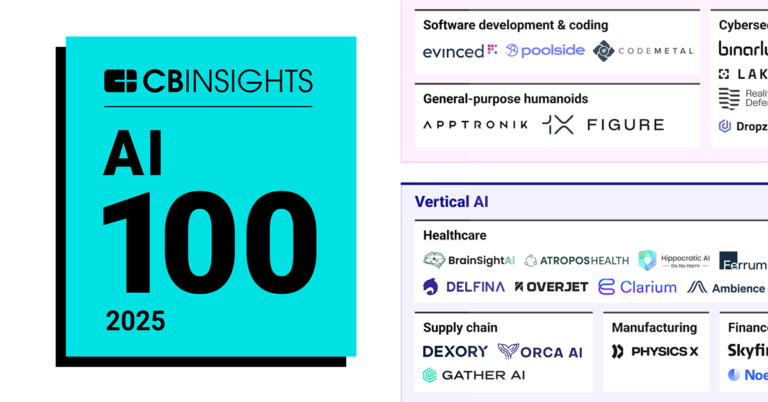
Binarly
Founded Year
2021Stage
Seed VC | AliveTotal Raised
$14.1MLast Raised
$10.5M | 2 yrs agoMosaic Score The Mosaic Score is an algorithm that measures the overall financial health and market potential of private companies.
+14 points in the past 30 days
About Binarly
Binarly specializes in firmware security and supply chain risk management within the cybersecurity industry. The company offers an AI-powered platform that detects and remediates known and unknown vulnerabilities in firmware and software supply chains. Binarly's services are designed to provide visibility into firmware and software vulnerabilities, identify malicious code, and offer prescriptive fixes for rapid resolution. It was founded in 2021 and is based in Santa Monica, California.
Loading...
Loading...
Research containing Binarly
Get data-driven expert analysis from the CB Insights Intelligence Unit.
CB Insights Intelligence Analysts have mentioned Binarly in 3 CB Insights research briefs, most recently on Oct 20, 2025.

Oct 20, 2025 report
Book of Scouting Reports: 2025’s Digital Health 50
May 16, 2025 report
Book of Scouting Reports: 2025’s AI 100
Apr 24, 2025 report
AI 100: The most promising artificial intelligence startups of 2025Expert Collections containing Binarly
Expert Collections are analyst-curated lists that highlight the companies you need to know in the most important technology spaces.
Binarly is included in 5 Expert Collections, including Cybersecurity.
Cybersecurity
11,028 items
These companies protect organizations from digital threats.
AI 100 (2024)
100 items
Artificial Intelligence (AI)
20,630 items
AI 100 (2025)
100 items
AI 100 (All Winners 2018-2025)
200 items
Binarly Patents
Binarly has filed 3 patents.
The 3 most popular patent topics include:
- wireless networking
- compiler construction
- cryptography

Application Date | Grant Date | Title | Related Topics | Status |
|---|---|---|---|---|
10/2/2024 | 2/25/2025 | Wireless networking, Memory management, Parallel computing, DEC hardware, Minicomputers | Grant |
Application Date | 10/2/2024 |
|---|---|
Grant Date | 2/25/2025 |
Title | |
Related Topics | Wireless networking, Memory management, Parallel computing, DEC hardware, Minicomputers |
Status | Grant |
Latest Binarly News
Nov 6, 2025
Binarly Transparency Platform 3.5 now supports Java archives and JVM bytecode Binarly released the Binarly Transparency Platform 3.5 with Java ecosystem support, enterprise-grade YARA integration, and operational upgrades. With this update, Binarly’s cryptographic algorithm identification engine now supports Java archives (JARs) and JVM bytecode, scanning both standalone and embedded files inside Docker containers or firmware. This means organizations can finally see what cryptographic primitives their Java-based products depend on, without needing access to source code. Built on Code Property Graph (CPG) analysis, the new engine tracks dataflow across functions to eliminate false positives and maps every finding to NIST IR 8457 categories to help measure post-quantum cryptography ( PQC ) readiness. Support currently covers Bouncy Castle, Apache Commons, Google Tink, and Guava, with Android package analysis arriving later this year. The platform refresh also features deep integration of YARA, the industry’s signature-based detection standard, across large-scale software and firmware portfolios. Traditionally, maintaining YARA rules across teams and suppliers has been plagued by syntax drift, rule sprawl, and inconsistent enforcement. Binarly eliminates that friction with an interactive YARA Playground for rule development (YARA and our own FwHunt), a governed Rules Manager with granular role-based access controls, and a real-time Rust-based YARA-X engine that validates rules before deployment. The result is a single governed pipeline where PSIRTs (Product Security Incident Response Teams), TPRM (Third Party Risk Management) teams, and procurement functions can drive consistent detections and evidence-based decisions across the enterprise. “Java support and enterprise-scale YARA integration solve two of the hardest blind spots in product security. Most teams struggle to understand what’s really inside their Java stacks and to operationalize YARA rules consistently across complex environments. We’re the first to build the tooling to connect data from existing threat-intelligence feeds and this release connects both worlds, providing deep cryptographic visibility and scalable threat-hunting capabilities,” said Alex Matrosov , CEO and Head of Research at Binarly. The Binarly Transparency Platform 3.5 also adds: Custom rule management: Security teams can define and deploy their own detection logic using YARA and FwHunt rules, the same internal schema Binarly uses for vulnerability and threat detections with more advanced code-driven rules. This bridges research and product security, allowing bespoke checks for vendor risk, hard-coded keys, or policy enforcement. Organization quotas: Simplifies license management with centralized allocation and visibility across distributed groups; Triage Enhancements to enable the addition of assignable statuses, threaded comments (with Markdown support), and dynamic charts; and backend upgrades that deliver faster performance, broader Android handling, and deeper extraction of cryptographic artifacts, from JARs to UEFI Secure Boot keys. From firmware to JVM bytecode, the Binarly Transparency Platform 3.5 is built by security research experts to give defenders a unified view of vulnerabilities, cryptographic posture, and reachability across complex software ecosystems. For procurement and third-party vendor risk teams, Binarly delivers measurable improvements in vendor assessment workflows by enabling private threat-intelligence ingestion, scoped rule enforcement, and transparent, evidence-backed risk reporting. Security teams benefit from faster rule validation, consistent detections, and streamlined triage, all while lowering the hidden operational costs that typically burden large-scale YARA programs. More about
Binarly Frequently Asked Questions (FAQ)
When was Binarly founded?
Binarly was founded in 2021.
Where is Binarly's headquarters?
Binarly's headquarters is located at 2450 Colorado Avenue, Santa Monica.
What is Binarly's latest funding round?
Binarly's latest funding round is Seed VC.
How much did Binarly raise?
Binarly raised a total of $14.1M.
Who are the investors of Binarly?
Investors of Binarly include Acrobator Ventures, WestWave Capital, Two Bear Capital, Canaan Partners, Blu Venture Investors and 15 more.
Who are Binarly's competitors?
Competitors of Binarly include Chainguard, Qwiet AI, SixMap, Prewave, ReversingLabs and 7 more.
Loading...
Compare Binarly to Competitors

Aqua Security focuses on securing containerized cloud native applications within the cybersecurity sector. The company provides a lifecycle solution that includes pre-deployment hygiene enforcement and real-time attack mitigation for cloud native applications. Aqua's clientele consists of large enterprises that require cloud security. Aqua Security was formerly known as Scalock. It was founded in 2015 and is based in Ramat Gan, Israel.
Oligo focuses on runtime application security and offers solutions for scanning and monitoring, supply chain security, application vulnerability management, and attack detection and response. It was founded in 2022 and is based in Tel Aviv, Israel.

RapidFort specializes in software attack surface management and operates within the cybersecurity domain. The company provides common vulnerabilities and exposures (CVE) images for secure software development, CVE remediation, and tools for vulnerability scanning, profiling, and hardening applications in both development and production environments. It's solutions aim to address compliance processes and improve software supply chain security and workload management. It was founded in 2020 and is based in Sunnyvale, California.

Veracode provides application security solutions across sectors, including government, financial services, software, technology, retail, and healthcare. The company offers services for the software development life cycle, including vulnerability detection, static and dynamic application security testing, software composition analysis, container security, application security posture management, and penetration testing. Veracode's platform integrates into development processes, providing feedback and remediation supported by artificial intelligence to improve developer efficiency and security. It was founded in 2006 and is based in Burlington, Massachusetts.

Flashpoint specializes in threat data and intelligence, focusing on cybersecurity and intelligence services. The company offers products including cyber threat intelligence, vulnerability intelligence, physical security intelligence, and national security intelligence, all enriched with human insights. Flashpoint serves businesses and government sectors, providing solutions that include fraud prevention, brand protection, and operational resilience against evolving threats. Flashpoint was formerly known as Flashpoint Intelligence. It was founded in 2010 and is based in Washington, DC.

Bright Security specializes in dynamic application security testing (DAST) and API security within the cybersecurity industry. The company offers solutions that integrate with continuous integration and delivery (CI/CD) pipelines to identify and manage vulnerabilities in web applications and APIs, catering to the needs of developers and security teams. Bright Security's services are designed to validate business logic, provide extensive vulnerability coverage, and offer clear remediation guidelines with a focus on low false positives. It was founded in 2018 and is based in San Rafael, California.
Loading...
